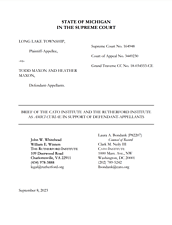Learn more about Cato’s Amicus Briefs Program.
Todd and Heather Maxon live on a five-acre property in Long Lake Township, Michigan. After receiving tips about potential zoning violations, the Township began investigating the Maxons. But the Township quickly realized that most of the property was not visible from street-level. So, in order to get the evidence needed for a new enforcement action, the Township hired a private drone company to fly an unmanned aerial vehicle (UAV) equipped with a high-resolution camera at low altitudes in and around the Maxons’ property. The Township did this on three separate occasions, each time without a warrant, until it had enough evidence to bring a civil enforcement action against the Maxons.
The Michigan Supreme Court has been asked to decide two questions: (1) whether the Township engaged in an unconstitutional search; and if so, (2) whether the exclusionary rule applies to bar the illegally obtained evidence. The Cato Institute and the Rutherford Institute filed an amici brief asking the Court to answer both questions in the affirmative.
In analyzing the scope of Fourth Amendment protections, the U.S. Supreme Court has articulated an often-unwieldy doctrine that asks courts to determine whether government conduct violates society’s reasonable expectation of privacy. This “reasonable expectation of privacy test” asks courts to grapple with “when a search is not a search” and has led to inconsistent and bizarre results. This case presents an opportunity for the Michigan Supreme Court to abandon this framework and find that the Michigan Constitution requires a return to the ordinary meaning of the text. In doing so, this Court should ask two questions: (1) Did a search occur? And (2) was the search reasonable?
In this case, the Township’s surveillance of the Maxons’ home was undoubtedly a search based on the ordinary, common-sense understanding of that term. A search is looking over or through something with a purpose of finding or uncovering information. And the Township’s highly directed observation of the Maxons’ property was a “search” for evidence of ordinance violations. Moreover, the Township had no justification for its failure to obtain a warrant, other than convenience, making its search unreasonable. And because the Township violated the Maxons’ constitutional rights, the Court should apply the exclusionary rule to prohibit its reliance on illegally obtained evidence. It shouldn’t matter that the Maxons are facing civil, rather than criminal proceedings. The exclusionary rule is currently one of the only viable remedies for individuals whose rights are violated by unreasonable searches and seizures. Allowing such constitutional violations to go unpunished will result in people losing any semblance of protection against government intrusion.

This work is licensed under a Creative Commons Attribution-NonCommercial-ShareAlike 4.0 International License.

